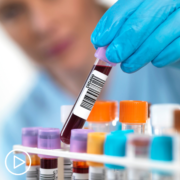What Exactly is Follicular Lymphoma? An Expert Explains
What Exactly is Follicular Lymphoma? An Expert Explains from Patient Empowerment Network on Vimeo.
What does follicular lymphoma mean exactly? Expert Dr. Sameh Gaballa from Moffitt Cancer Center explains what occurs in the body with follicular lymphoma and where follicular lymphoma cells are typically found.
Dr. Sameh Gaballa is a hematologist/oncologist specializing in treating lymphoid malignancies from Moffitt Cancer Center. Learn more about Dr. Gaballa.
See More from START HERE Follicular Lymphoma
Related Resources:

|

|

|
Transcript:
Lisa Hatfield:
Can you provide an explanation of what follicular lymphoma is?
Dr. Sameh Gaballa:
Yeah, absolutely. Thank you, Lisa. So, follicular lymphoma is a type of B-cell non-Hodgkin’s lymphoma. What does that mean? It’s basically, so in your body, there are cells that are part of the immune system; these are lymphocytes. These cells normally, their normal function, is to fight infection, they’re part of your immune system. They actually are involved also with fighting cancers, but sometimes they become malignant.
But not all lymphomas are the same. Lymphomas are a huge family. So there’s Hodgkin’s lymphoma, there is non-Hodgkin’s lymphoma. Within non-Hodgkin’s lymphoma, there is a type called B-cell non-Hodgkin’s and there’s a T-cell non-Hodgkin’s lymphoma. And then within B-cell non-Hodgkin’s lymphoma, there are two big groups. So one group, they are these aggressive lymphomas that grow quickly, they can make you sick quickly, and these lymphomas we have to treat right away.
And then you have those slow-growing indolent lymphomas that are sometimes very commonly actually diagnosed by chance, or incidentally, that’s usually the most common way these are diagnosed. And the most common slow-growing indolent lymphoma is going to be follicular lymphoma. Now, where do you find these lymphomas? It’s a blood disease.
So, again, we said that those cells are normally borne in the bone marrow, they are in the blood, they’re in the lymph nodes, they’re in the spleen. So usually you would find those malignant cells usually in the lymph nodes, but you could also find them sometimes in the spleen or in the blood or in the bone marrow as well. And the symptoms they cause will be dependent on where they are and how big the, those, the involvement is.










